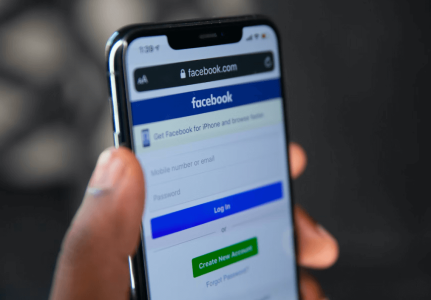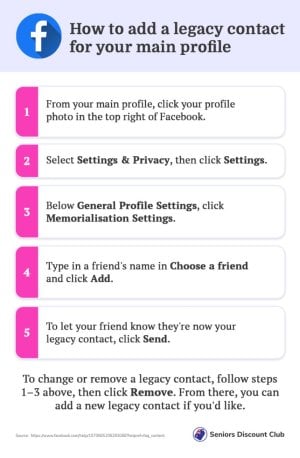Woman receives haunting messages from her late husband on Facebook
- Replies 19
Losing a loved one is an emotionally challenging experience that can leave us feeling vulnerable and overwhelmed. However, the grieving process can become even more challenging when we unexpectedly encounter reminders of our dearly departed on the internet.
In a recent incident that occurred in central Victoria, a woman was forced to confront this very situation when her husband's Facebook account suddenly began sending her messages from beyond the grave.
What she initially thought were heartfelt 'posthumous' messages from her beloved turned out to be a bunch of advertisements, leading her down a disturbing rabbit hole. After delving deeper, Jenny Singe soon discovered that her late husband's account had been hacked by ruthless cybercriminals.
As she struggled to come to grips with this violation of privacy, Singe expressed her distress and discomfort, reflecting on the difficulty of navigating the ever-changing digital world in the face of grief.

The heart-wrenching story took a turn for the worse when Singe turned to Facebook for help. Instead of providing her with the much-needed support and understanding, she was met with more hurdles to jump over in her grieving process.
As she reached out to have her husband's account taken down, the social media giant asked her to provide irrefutable proof of his passing - including a copy of his death certificate and other documentation.
This request only added to the distress and burden that Singe was already facing. 'I have been through enough with losing my husband, and now they were asking me to prove that he was dead,' she argued.
For a woman who had already lost so much, it was beyond comprehension that she had to go through even more to have her husband's memories protected. Her frustration and despair were palpable, as she questioned why she had to prove her innocence when she had done nothing wrong.

In response to Singe's ordeal, a spokesperson for Meta (formerly known as Facebook) extended their condolences and assured her that they were taking the matter seriously. They emphasised their commitment to protecting their users from hackers and the distress they cause, and are actively investigating the situation.
As part of their protocol, when Meta is made aware of a user's passing, they memorialise the account. This allows friends and family to continue accessing and sharing memories but prohibits anyone from logging into the account.
They also encourage Facebook users to appoint a 'legacy contact', who can manage their profile in the event of their passing. This feature allows users to select someone they trust to manage their Facebook profile once they've passed away.
When a user adds a legacy contact, that person can make important decisions about the user's profile after it's memorialised. This includes the ability to write a pinned post, update the profile picture and cover photo, request the removal of the account, and download a copy of what the user has shared on Facebook.
It's important to note that a legacy contact cannot log into the user's account or read their private messages. They also cannot remove any friends or make new friend requests.
Nonetheless, having a legacy contact can be incredibly useful in ensuring that the user's Facebook profile is managed according to their wishes after their passing.
In the unfortunate event of a loved one passing away, it's good to know that Facebook has protocols in place to help manage their profile.
To those who have lost a loved one, our deepest sympathy goes out to you. We understand the pain of losing someone and recognise that social media can play a significant role in the grieving process.
Members, we hope that this article has been helpful and that you feel empowered to take the necessary steps to manage your loved one's Facebook profile. By doing so, you can ensure that their digital legacy is preserved and that their memory continues to live on - without hackers taking advantage of it.
We'd love to hear your thoughts about this topic. Have you had to manage a loved one's social media profile after they've passed away? What steps did you take to ensure their memory was honoured and their account was protected? Please share your experiences in the comments below.
In a recent incident that occurred in central Victoria, a woman was forced to confront this very situation when her husband's Facebook account suddenly began sending her messages from beyond the grave.
What she initially thought were heartfelt 'posthumous' messages from her beloved turned out to be a bunch of advertisements, leading her down a disturbing rabbit hole. After delving deeper, Jenny Singe soon discovered that her late husband's account had been hacked by ruthless cybercriminals.
As she struggled to come to grips with this violation of privacy, Singe expressed her distress and discomfort, reflecting on the difficulty of navigating the ever-changing digital world in the face of grief.

For one woman, the memory of her late husband has taken on a life of its own in the form of Facebook messages from beyond the grave. Credit: Unsplash/Solen Feyissa.
The heart-wrenching story took a turn for the worse when Singe turned to Facebook for help. Instead of providing her with the much-needed support and understanding, she was met with more hurdles to jump over in her grieving process.
As she reached out to have her husband's account taken down, the social media giant asked her to provide irrefutable proof of his passing - including a copy of his death certificate and other documentation.
This request only added to the distress and burden that Singe was already facing. 'I have been through enough with losing my husband, and now they were asking me to prove that he was dead,' she argued.
For a woman who had already lost so much, it was beyond comprehension that she had to go through even more to have her husband's memories protected. Her frustration and despair were palpable, as she questioned why she had to prove her innocence when she had done nothing wrong.

Jenny Singe was left feeling 'distressed' after she began receiving messages from her late husband's account, who passed away two years ago. Credit: Pexels/Kampus Production.
In response to Singe's ordeal, a spokesperson for Meta (formerly known as Facebook) extended their condolences and assured her that they were taking the matter seriously. They emphasised their commitment to protecting their users from hackers and the distress they cause, and are actively investigating the situation.
As part of their protocol, when Meta is made aware of a user's passing, they memorialise the account. This allows friends and family to continue accessing and sharing memories but prohibits anyone from logging into the account.
They also encourage Facebook users to appoint a 'legacy contact', who can manage their profile in the event of their passing. This feature allows users to select someone they trust to manage their Facebook profile once they've passed away.
When a user adds a legacy contact, that person can make important decisions about the user's profile after it's memorialised. This includes the ability to write a pinned post, update the profile picture and cover photo, request the removal of the account, and download a copy of what the user has shared on Facebook.
It's important to note that a legacy contact cannot log into the user's account or read their private messages. They also cannot remove any friends or make new friend requests.
Nonetheless, having a legacy contact can be incredibly useful in ensuring that the user's Facebook profile is managed according to their wishes after their passing.
In the unfortunate event of a loved one passing away, it's good to know that Facebook has protocols in place to help manage their profile.
To those who have lost a loved one, our deepest sympathy goes out to you. We understand the pain of losing someone and recognise that social media can play a significant role in the grieving process.
Members, we hope that this article has been helpful and that you feel empowered to take the necessary steps to manage your loved one's Facebook profile. By doing so, you can ensure that their digital legacy is preserved and that their memory continues to live on - without hackers taking advantage of it.
We'd love to hear your thoughts about this topic. Have you had to manage a loved one's social media profile after they've passed away? What steps did you take to ensure their memory was honoured and their account was protected? Please share your experiences in the comments below.








